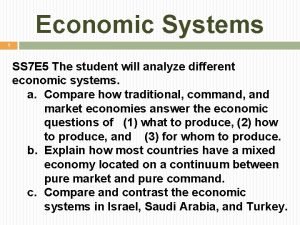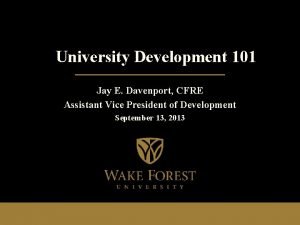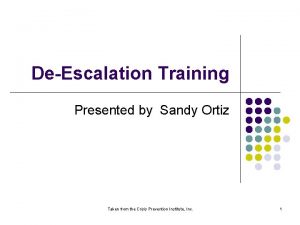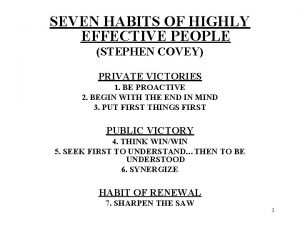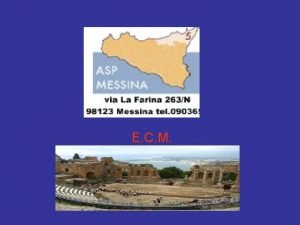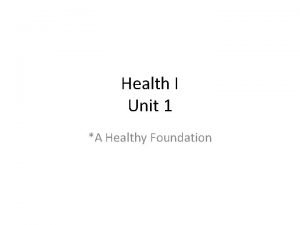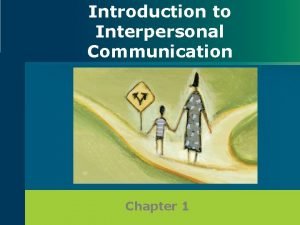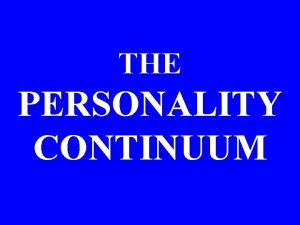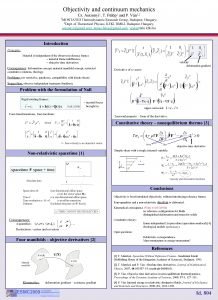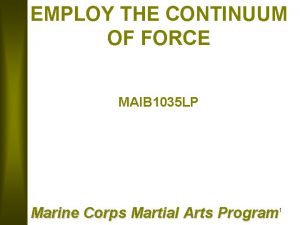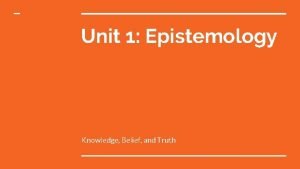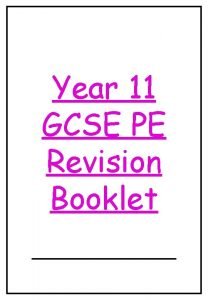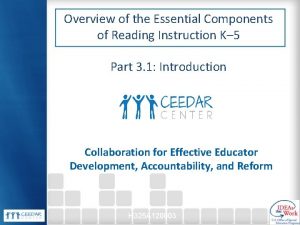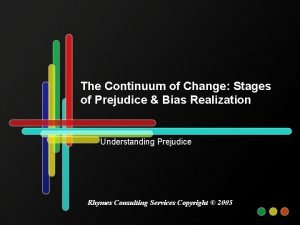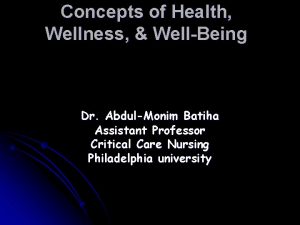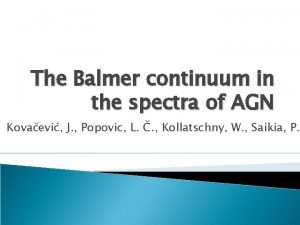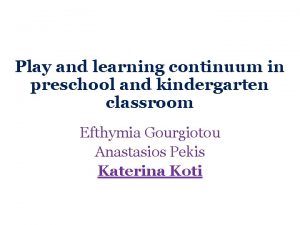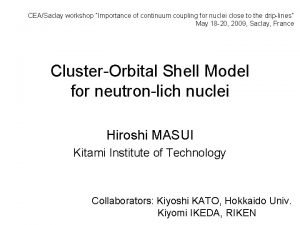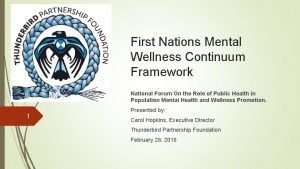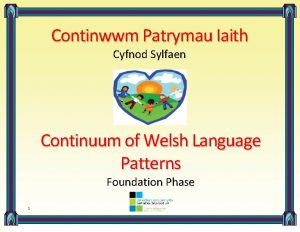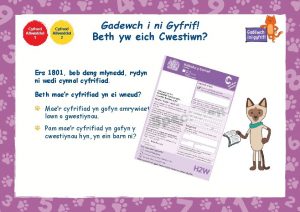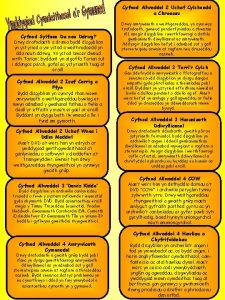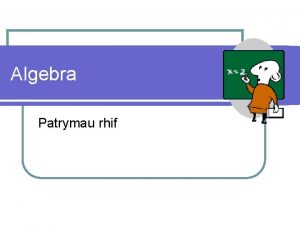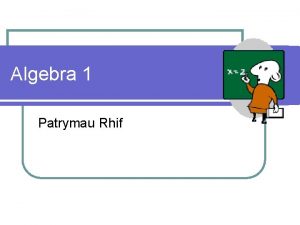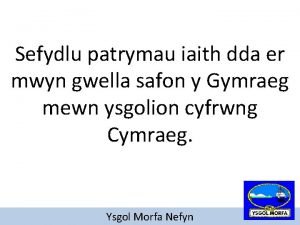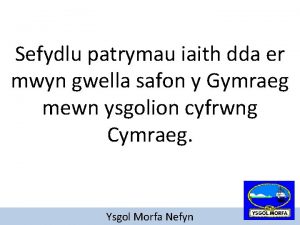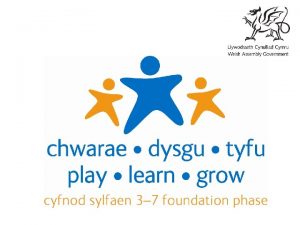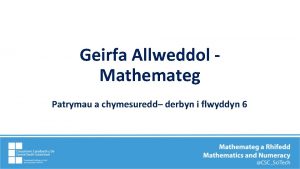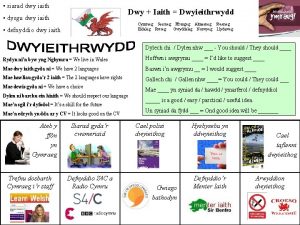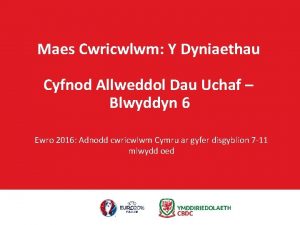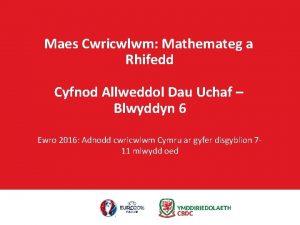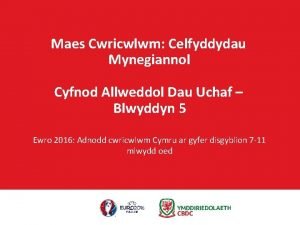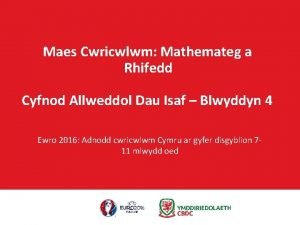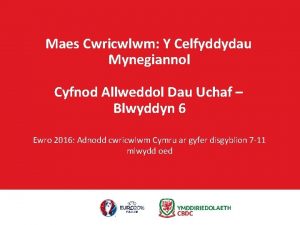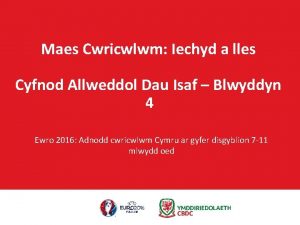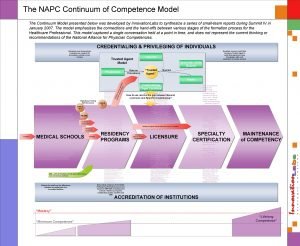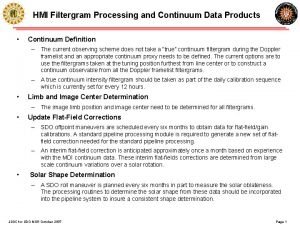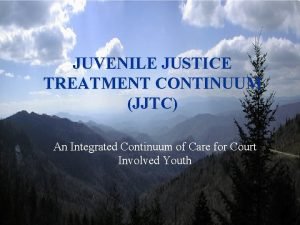Continwwm Patrymau Iaith Cyfnod Allweddol 2 Continuum of




![▪ How are you feeling? ▪ Sut wyt ti’n teimlo? ▪ I am [feeling] ▪ How are you feeling? ▪ Sut wyt ti’n teimlo? ▪ I am [feeling]](https://slidetodoc.com/presentation_image_h/15826bb618f6658d64fbb1f22124c341/image-5.jpg)
![▪ Where do you [verb]? ▪ Ble rwyt ti’n [verb}? Year 3 ▪ I ▪ Where do you [verb]? ▪ Ble rwyt ti’n [verb}? Year 3 ▪ I](https://slidetodoc.com/presentation_image_h/15826bb618f6658d64fbb1f22124c341/image-6.jpg)
![▪ I don’t want to [verb], I want to [verb] with [Sam]. ▪ Dw ▪ I don’t want to [verb], I want to [verb] with [Sam]. ▪ Dw](https://slidetodoc.com/presentation_image_h/15826bb618f6658d64fbb1f22124c341/image-7.jpg)
![§ He/she has a [noun]. § Mae [noun] gyda fe/hi § Where does [Sam] § He/she has a [noun]. § Mae [noun] gyda fe/hi § Where does [Sam]](https://slidetodoc.com/presentation_image_h/15826bb618f6658d64fbb1f22124c341/image-8.jpg)
![▪ I don’t like [noun/verb] because it’s [adjective] but plus extended language. ▪ Dw ▪ I don’t like [noun/verb] because it’s [adjective] but plus extended language. ▪ Dw](https://slidetodoc.com/presentation_image_h/15826bb618f6658d64fbb1f22124c341/image-9.jpg)
![▪ He/She likes/loves [noun/verb]. ▪ Mae e’n/hi’n hoffi/dwlu ar [noun/verb]. Year 4 ▪ [Sam] ▪ He/She likes/loves [noun/verb]. ▪ Mae e’n/hi’n hoffi/dwlu ar [noun/verb]. Year 4 ▪ [Sam]](https://slidetodoc.com/presentation_image_h/15826bb618f6658d64fbb1f22124c341/image-10.jpg)
![Year 4 §Why do you want [noun/verb]? §Pam wyt ti eisiau [noun/verb]? §I want Year 4 §Why do you want [noun/verb]? §Pam wyt ti eisiau [noun/verb]? §I want](https://slidetodoc.com/presentation_image_h/15826bb618f6658d64fbb1f22124c341/image-11.jpg)
![▪ How was the weather yesterday/this morning/this afternoon/on [weekday]? ▪ Sut oedd y tywydd ▪ How was the weather yesterday/this morning/this afternoon/on [weekday]? ▪ Sut oedd y tywydd](https://slidetodoc.com/presentation_image_h/15826bb618f6658d64fbb1f22124c341/image-12.jpg)
![▪ No, I am not able to [verb] but I am able to [verb]. ▪ No, I am not able to [verb] but I am able to [verb].](https://slidetodoc.com/presentation_image_h/15826bb618f6658d64fbb1f22124c341/image-13.jpg)
![§What is [Sam] able to do? §Beth mae [Sam] yn gallu wneud? § Is §What is [Sam] able to do? §Beth mae [Sam] yn gallu wneud? § Is](https://slidetodoc.com/presentation_image_h/15826bb618f6658d64fbb1f22124c341/image-14.jpg)

![▪ My favourite programme is [programme] because it’s [adjective]. ▪ Fy hoff raglen deledu ▪ My favourite programme is [programme] because it’s [adjective]. ▪ Fy hoff raglen deledu](https://slidetodoc.com/presentation_image_h/15826bb618f6658d64fbb1f22124c341/image-16.jpg)

![§ We enjoy [verb]. § Rydyn ni’n mwynhau [verb]. § We do not enjoy § We enjoy [verb]. § Rydyn ni’n mwynhau [verb]. § We do not enjoy](https://slidetodoc.com/presentation_image_h/15826bb618f6658d64fbb1f22124c341/image-18.jpg)






- Slides: 24

Continwwm Patrymau Iaith Cyfnod Allweddol 2 Continuum of Welsh Language Patterns Key Stage 2 1

Cydnabyddiaethau/ Acknowledgements Hoffai tîm Swyddogion y Gymraeg mewn Addysg Consortiwm Canolbarth y De ddiolch yn fawr iawn i Phil Hughes o Ysgol Gynradd St Athan, Claire Westlake o Ysgol Gynradd Creigiau a Hannah Cadene o Ysgol Gynradd Allensbank am eu holl waith galed wrth gyflawni’r dasg o greu’r continwwm sain yma. The Central South Consortium’s Welsh in Education Team would like to express their sincere appreciation to Phil Hughes from St Athan Primary School, Claire Westlake from Creigiau Primary School and Hannah Cadene from Allensbank Primary School for all their hard work in creating this audio continuum. 2

Continuum of Welsh Language Patterns This Continuum is a whole school approach to teaching Welsh through a series of progressive and developmental language patterns. These language patterns form the basis of the scheme of work. There is progression of linguistic skills from Foundation Phase to Year 6. The Continuum enables teachers to differentiate for individual learners in each class. It is imperative that practitioners revise and build upon the linguistic skills achieved in previous years. 2 These language patterns can be used incidentally and will also promote the use of Welsh in other subjects.

Continwwm Patrymau Iaith Mae’r Continwwm hwn yn ddull ysgol gyfan o addysgu’r Gymraeg drwy gyfres o batrymau iaith cynyddol a datblygiadol. Mae’r patrymau iaith yma’n gosod sail i’r Cynllun Gwaith. Mae’r strwythur ieithyddol yn dangos datblygiad o’r Cyfnod Sylfaen i Flwyddyn 6. Mae’r Continwwm yn galluogi athrawon i wahaniaethu rhwng dysgwyr o fewn eu dosbarthiadau. Mae’n hanfodol adolygu ac mae’n bwysig i ymarferwyr ail-ymweld a datblygu’r patrymau iaith a ddysgwyd yn y blynyddoedd blaenorol. 3 Dylid defnyddio’r patrymau iaith yma’n achlysurol ac hefyd i hyrwyddo defnydd o’r Gymraeg mewn pynciau eraill.
![How are you feeling Sut wyt tin teimlo I am feeling ▪ How are you feeling? ▪ Sut wyt ti’n teimlo? ▪ I am [feeling]](https://slidetodoc.com/presentation_image_h/15826bb618f6658d64fbb1f22124c341/image-5.jpg)
▪ How are you feeling? ▪ Sut wyt ti’n teimlo? ▪ I am [feeling] because [reason] ▪ Dw i’n [feeling] achos [reason] Year 3 ▪ Where do you live? ▪ Ble rwyt ti’n byw? ▪ I live in* [place] in a [house type] with [Sam/pet] called [name]. ▪ Dw i’n byw yn [place] mewn [house type] gyda [Sam/pet] o’r enw [name]. ▪ Do you live in a [house type]? ▪ Wyt ti’n bwy mewn [house type]? ▪ [Sam] lives in* a [house type]. ▪ Mae [Sam] yn byw mewn [house type]. ▪ Is there a [noun] in* [room of the house]? Yes/No ▪ Oes [noun] yn* [room of house]? Oes/nag oes * in in the yn yr in a mewn ▪ There is a [noun] in* [room of the house] but there is not a [noun] in* [room of the house] ▪ Mae [noun] yn* [room of the house] ond does dim [noun] yn* [room of the house]. ▪ They live in a* [house type]. ▪ Maen nhw’n byw mewn* [house type]. 14 yn
![Where do you verb Ble rwyt tin verb Year 3 I ▪ Where do you [verb]? ▪ Ble rwyt ti’n [verb}? Year 3 ▪ I](https://slidetodoc.com/presentation_image_h/15826bb618f6658d64fbb1f22124c341/image-6.jpg)
▪ Where do you [verb]? ▪ Ble rwyt ti’n [verb}? Year 3 ▪ I [verb] in* [room of the house]. ▪ Dw i’n [verb] yn* [room of the house]. ▪ Where does [Sam] [verb]? ▪ Ble mae [Sam] yn [verb]? ▪ Sam] [verb] in* [room of the house]. ▪ Mae [Sam] yn [verb] yn*[room of the house]. ▪ Is it [weather]? ▪ Ydy hi’n [weather]? ▪ Yes, it is [weather]. ▪ Ydy, mae hi’n [weather]. ▪ No, it is not [weather]. ▪ Nag ydy, dydy hi ddim yn [weather]. ▪ No, it is not [weather] but it is [weather]. ▪ Nag ydy, dydy hi ddim yn [weather] ond mae hi’n [weather]. 14 * in yn in the yn yr in a mewn
![I dont want to verb I want to verb with Sam Dw ▪ I don’t want to [verb], I want to [verb] with [Sam]. ▪ Dw](https://slidetodoc.com/presentation_image_h/15826bb618f6658d64fbb1f22124c341/image-7.jpg)
▪ I don’t want to [verb], I want to [verb] with [Sam]. ▪ Dw i ddim eisiau [verb], dw i eisiau [verb] gyda [Sam]. ▪ What are you able to do? ▪ Beth wyt ti’n gallu wneud? ▪ I am able to [verb]. ▪ Dw i’n gallu [verb]. ▪ I am not able to [verb]. ▪ Dw i ddim yn gallu [verb]. ▪ I have a [noun] but I do not have a [noun]. ▪ Mae [noun] gyda fi ond does dim [noun] gyda fi. ▪ Sam has a [noun]. ▪ Mae [noun] gyda [Sam]. ▪ Sam does not have a [noun]. ▪ Does dim [noun] gyda [Sam]. 16 Year 3
![Heshe has a noun Mae noun gyda fehi Where does Sam § He/she has a [noun]. § Mae [noun] gyda fe/hi § Where does [Sam]](https://slidetodoc.com/presentation_image_h/15826bb618f6658d64fbb1f22124c341/image-8.jpg)
§ He/she has a [noun]. § Mae [noun] gyda fe/hi § Where does [Sam] [verb]? § Ble mae [Sam] yn [verb]? § [Sam] [verb] in the/in a [name of place]. § Mae [Sam] yn [verb] yn y/mewn [name of place]. § Where did you go? § Ble est ti? § I went to/to the [place]. § Es i i/i’r [place]. § What did you have? § Beth gest ti? § I had [noun]. § Ces i [noun]. 16 Year 3
![I dont like nounverb because its adjective but plus extended language Dw ▪ I don’t like [noun/verb] because it’s [adjective] but plus extended language. ▪ Dw](https://slidetodoc.com/presentation_image_h/15826bb618f6658d64fbb1f22124c341/image-9.jpg)
▪ I don’t like [noun/verb] because it’s [adjective] but plus extended language. ▪ Dw i ddim yn hoffi [noun/verb] achos mae’n [adjective] ond [plus extended language]. Year 4 ▪ I love [noun/verb] ▪ Dw i’n dwlu ar [noun/verb] ▪ I love [noun/verb] because it’s [adjective]. ▪ Dw i’n dwlu ar [noun/verb] achos mae’n [adjective]. ▪ I really don’t like [noun/verb] ▪ Mae’n gas ‘da fi [noun/verb] ▪ I really don’t like [noun/verb] because it’s [adjective]. ▪ Mae’n gas ‘da fi [noun/verb] achos mae’n [adjective]. ▪ I love [noun/verb] because it’s [adjective] but plus extended language. ▪ Dw i’n dwlu ar [noun/verb] achos mae’n [adjective] ond [plus extended language]. ▪ I prefer [noun/verb] to [noun/verb]. ▪ Mae’n well ‘da fi [noun/verb] na [noun/verb]. ▪ I like [noun/verb] but I prefer [noun/verb]. ▪ Dw i’n hoffi [noun/verb] ond mae’n well ‘da fi [noun/verb]. 18 but ond achos because achos mae’n because it is
![HeShe likesloves nounverb Mae enhin hoffidwlu ar nounverb Year 4 Sam ▪ He/She likes/loves [noun/verb]. ▪ Mae e’n/hi’n hoffi/dwlu ar [noun/verb]. Year 4 ▪ [Sam]](https://slidetodoc.com/presentation_image_h/15826bb618f6658d64fbb1f22124c341/image-10.jpg)
▪ He/She likes/loves [noun/verb]. ▪ Mae e’n/hi’n hoffi/dwlu ar [noun/verb]. Year 4 ▪ [Sam] likes [noun/verb] but he/she does not like [noun/verb]. ▪ Mae [Sam] yn hoffi [noun/verb] ond dydy e/hi ddim yn hoffi [noun/verb]. ▪ What’s the matter with [Sam]? ▪ Beth sy’n bod ar [Sam]? ▪ [Sam]/He/She has a bad [body part]. ▪ Mae [body part] tost gyda [Sam]/fe/hi. ▪ [Sam] has [illness] ▪ Mae [illness] ar [Sam]. but ond achos because achos mae’n because it is 18
![Year 4 Why do you want nounverb Pam wyt ti eisiau nounverb I want Year 4 §Why do you want [noun/verb]? §Pam wyt ti eisiau [noun/verb]? §I want](https://slidetodoc.com/presentation_image_h/15826bb618f6658d64fbb1f22124c341/image-11.jpg)
Year 4 §Why do you want [noun/verb]? §Pam wyt ti eisiau [noun/verb]? §I want [noun/verb] because it’s [adjective] but I don’t want [noun/verb] because it’s [adjective]. §Dw i eisiau [noun/verb] achos mae’n [adjective] ond dw i ddim eisiau [noun/verb] achos mae’n [adjective]. §Do you want [noun/verb]? § Wyt ti eisiau [noun/verb]? §Yes, I want [noun/verb] because it’s [adjective]. § Ydw, dw i eisiau [noun/verb] achos mae’n [adjective]. §No, I don’t want [noun/verb] because it’s [adjective]. §Nag ydw, dw i ddim eisiau [noun/verb] achos mae’n [adjective]. §Where is the [noun]? § Ble mae’r [noun]? ▪ The [noun] is on/in the [noun]. ▪ Mae’r [noun] ar y/yn y [noun]. but ond achos because achos mae’n because it is 18
![How was the weather yesterdaythis morningthis afternoonon weekday Sut oedd y tywydd ▪ How was the weather yesterday/this morning/this afternoon/on [weekday]? ▪ Sut oedd y tywydd](https://slidetodoc.com/presentation_image_h/15826bb618f6658d64fbb1f22124c341/image-12.jpg)
▪ How was the weather yesterday/this morning/this afternoon/on [weekday]? ▪ Sut oedd y tywydd ddoe/y bore ‘ma/y prynhawn ‘ma/dydd [weekday]? ▪ It was [weather] and [weather]. ▪ Roedd hi’n [weather] ac yn [weather]. ▪ It was not [weather]. ▪ Doedd hi ddim yn [weather]. ▪ It was [weather] and [weather]. It was not [weather]. ▪ Roedd hi’n [weather] ac yn [weather]. Doedd hi ddim yn [weather]. ▪ How is the weather? Today, it is [weather] but yesterday, it was [weather]. ▪ Sut mae’r tywydd? Heddiw, mae hi’n [weather] ond ddoe, roedd hi’n [weather]. ▪ What are you able to do? ▪ Beth wyt ti’n gallu wneud? ▪ I am able to [verb] very well. ▪ Dw i’n gallu [verb] yn dda iawn. ▪ I am not able to [verb] at all. ▪ Dw i ddim yn gallu [verb] o gwbl. ▪ Are you able to [verb]? Yes, I am able to [verb] but I prefer to [verb]. ▪ Wyt ti’n gallu [verb]? Ydw, dw i’n gallu [verb] ond mae’n well ‘da fi [verb]. 20 Year 4
![No I am not able to verb but I am able to verb ▪ No, I am not able to [verb] but I am able to [verb].](https://slidetodoc.com/presentation_image_h/15826bb618f6658d64fbb1f22124c341/image-13.jpg)
▪ No, I am not able to [verb] but I am able to [verb]. ▪ Nag ydw, dw i ddim yn gallu [verb] ond dw i’n gallu [verb]. ▪ Who is able to [verb]? ▪ Pwy sy’n gallu [verb]? ▪ [Sam] is able to [verb]. ▪ Mae [Sam] yn gallu [verb]. 20 Year 4
![What is Sam able to do Beth mae Sam yn gallu wneud Is §What is [Sam] able to do? §Beth mae [Sam] yn gallu wneud? § Is](https://slidetodoc.com/presentation_image_h/15826bb618f6658d64fbb1f22124c341/image-14.jpg)
§What is [Sam] able to do? §Beth mae [Sam] yn gallu wneud? § Is [Sam] able to [verb]? Yes/No §Ydy [Sam] yn gallu [verb]? Ydy/Nag ydy §He/She is able to [verb]. §Mae e’n/hi’n gallu [verb]. §He/She is not able to [verb]. §Dydy e/hi ddim yn gallu [verb]. §When is your birthday? §Pryd mae dy benblwydd di? §My birthday is in [month and date]. §Mae fy mhenblwydd ym mis [month and date]. §Does [Sam] have a [noun]? §Oes [noun] gyda [Sam]? §Yes, [Sam] has a [noun] but he/she does not have a [noun]. §Oes, mae [noun] gyda [Sam] ond does dim [noun] gyda fe/hi. §How much does it cost? §Faint mae’n gostio? 20 §It costs [number] pound/ pence. §Mae’n costio [number] punt/ceiniog Year 4

▪ What time is it ? ▪ Faint o’r gloch ydy hi? ▪ It is half past/quarter to/quarter past [number] o’clock. ▪ Mae hi’n hanner awr wedi/chwarter wedi [number] o’r gloch ▪ It is [activities in school day] time. ▪ Mae hi’n amser [activities in school day]. ▪ When do you [verb]? ▪ Pryd wyt ti’n [verb]? ▪ Which day? [weekday] ▪ Pa ddydd? [weekday]. ▪ I [verb] on [weekday]. ▪ Dw i’n [verb] ar ddydd [weekday]. ▪ When does [Sam] [verb]? ▪ Pryd mae [Sam] yn [verb]? ▪ [Sam] [verb] on [weekday]. ▪ Mae Sam yn [verb] ar ddydd [weekday]. ▪ What is you favourite TV programme? ▪ Beth ydy dy hoff raglen deledu? 22 Year 5
![My favourite programme is programme because its adjective Fy hoff raglen deledu ▪ My favourite programme is [programme] because it’s [adjective]. ▪ Fy hoff raglen deledu](https://slidetodoc.com/presentation_image_h/15826bb618f6658d64fbb1f22124c341/image-16.jpg)
▪ My favourite programme is [programme] because it’s [adjective]. ▪ Fy hoff raglen deledu ydy [programme] achos mae’n [adjective]. ▪ I love [programme] and [programme] because they are [adjective]. ▪ Dw i’n dwlu ar [programme] achos maen nhw’n [adjective]. ▪ What did you see on the television? ▪ Beth welaist ti ar y teledu? ▪ I saw [programme]. ▪ Gwelais i [programme]. ▪ Did you see [programme]? Yes/No. ▪ Welaist ti [programme]? Do/Naddo. ▪ It was [adjective]. ▪ Roedd e’n/hi’n [adjective]. ▪ What do you enjoy [verb]. ▪ Beth wyt ti’n mwynhau [verb]? ▪ I enjoy [verb]. I do not enjoy [verb]. ▪ Dw i’n mwynhau [verb]. Dw i ddim yn mwynhau [verb]. ▪ Do you enjoy [verb/programme]? ▪ Wyt ti’n mwynhau [verb/programme]? ▪ Yes, I enjoy [verb] because [express an opinion]. ▪ No, I do not enjoy [verb] because [express an opinion]. ▪ Ydw, dw i’n mwynhau [verb] achos [express an opinion]. ▪ Nag 22 ydw, dw i ddim yn mwynhau [verb] achos [exp. opinion]. Year 5

Year 6 ▪ Where did you go? ▪ Ble est ti? ▪ I went to/to the [place] with [person] on/in [when]. ▪ Es i i/i’r [place] gyda [person] ar/yn [when]. ▪ Did you go to/to the [place]? Yes/No ▪ Est ti i/i’r [place]? Do/Naddo ▪ How did you go? ▪ Sut est ti? ▪ I went in a/on the/in the [noun]. ▪ Es i mewn/ar y/yn y [noun]. ▪ With who? ▪ Gyda phwy? ▪ I 24 went with [person]. ▪ Es i gyda [person].
![We enjoy verb Rydyn nin mwynhau verb We do not enjoy § We enjoy [verb]. § Rydyn ni’n mwynhau [verb]. § We do not enjoy](https://slidetodoc.com/presentation_image_h/15826bb618f6658d64fbb1f22124c341/image-18.jpg)
§ We enjoy [verb]. § Rydyn ni’n mwynhau [verb]. § We do not enjoy [verb]. ▪ Dydyn ni ddim yn mywnhau [verb]. ▪ They want to [verb]. ▪ Maen nhw eisiau [verb]. ▪ ▪ What do you think of [noun/verb/person/book etc. ]? ▪ Beth wyt ti’n feddwl o [noun/verb/person/book etc. ]? ▪ In my opinion [noun/verb/person/book etc. ] is [adjective]. ▪ Yn fy marn i mae [noun/verb/person/book etc. ] yn [adjective]. ▪ I agree. ▪ Dw i’n cytuno. ▪ I disagree. ▪ Dw i’n anghytuno. ▪ What have you been doing? ▪ Beth wyt ti wedi bod yn wneud? ▪ I 24 have been [verb]. ▪ Dw i wedi bod yn [verb]. Year 6

▪ How will the weather be tomorrow? ▪ Sut fydd y tywydd yfory? ▪ It will be [weather] and [weather]. ▪ Bydd hi’n [weather] ac yn [weather]. ▪ It will not be [weather]. ▪ Fydd hi ddim yn [weather]. ▪ What did you [past tense verb]? ▪ Beth [past tense verb] ti ? ▪ Did you see [noun]? Yes/No ▪ Welaist ti [noun]? Do/Naddo ▪ I had a [adjective] time. ▪ Ces i amser [adjective]. ▪ Did you have a [noun]? Yes/No ▪ Gest ti [noun]? Do/Naddo ▪ What would you like to [verb]? ▪ Beth hoffet ti [verb]? ▪ ▪ I would like to [verb] because it’s [adjective]. Hoffwn i [verb] achos mae’n [adjective]. I 26 am in my element [verb] but [verb] is better. Dw i wrth fy modd yn [verb] ond mae [verb] yn well. Year 6

28

29

Geirfa’r Continiwm Continuum Glossary Annwyd – cold Anghygoel - amazing A Da iawn / yn dda iawn – very good Darllen – reading Dawnsio - dancing Deuddeg / ddeuddeg twenty Diflas / ddiflas – miserable, boring Dydd Gwener - Friday D Bendigedig / Fendigedig – brilliant Bochdew – hamster Boeth (yn boeth) - hot Bore ‘ma – this morning Bresych – cabbage Brwsio dannedd – brushing teeth Bwrw eira – snowing Bwrw glaw – raining Bys – finger B Dd Caerdydd/ yng Nghaerdydd Chwarae – play – Cardiff Chwarae hoci – play hockey Cath – cat Carafan – caravan Cegin/ y gegin – kitchen Ci – dog Cyffrous - exciting C Ch E F Enwog -famous

Ffwrn - oven Ff I Glanhau – clean Gweld / weld – see Gwely – bed Gweithio – work Gwyliau - hoildays Gwylio – watch Gwylio’r teledu – watch television Gwych/ yn wych – great Gymnasteg – gymnastics O gwbl – at all G J Marchogaeth – horseriding Neidio – jump Melys / yn felys – tasty Nofio – swim, swimming Neithiwr – last night M N Hapus - happy Heulog – sunny Hoci – hockey Hufen iâ – ice cream Hwyl - fun Ng H Lolfa – Living room/ lounge Lliwgar – colourful Lolipop – lollypop Llyfrau - books Losin - sweets L O gwbl – at all Oren - orange O Ll Parc – park Pêl droed – football Pêl rwyd - netball Pen–blwydd - birthday Pensil – pencil Poeth - hot Pren mesur - ruler Prynhawn ‘ma – this afternoon Pump - five Pysgodyn - fish P

Rygbi – rugby Rhedeg - run Ph R T Th Tacsi – taxi Teulu / fy nheulu – family Traeth – beach Trên - train Tri / i dri – three Tŵr Eiffel – Eiffel Tower Tŷ – house Tŷ ar wahan – detached house Tŷ pâr – semi detached Tŷ teras – terraced house Ystafell/ ‘stafell – room Ystafell wely/ ‘stafell wely – bedroom Ystafell ymolchi/ ‘stafell ymolchi – bathroom Y Rh Un ar ddeg – eleven Sglodion - chips Siocled – chocolate Siop – shop Swnllyd - noisy S Wedi blino - tired U W
 Economic system continuum
Economic system continuum Donor commitment continuum
Donor commitment continuum Cpi crisis development behavior levels
Cpi crisis development behavior levels Integration continuum for sport participation
Integration continuum for sport participation The seven habits paradigm
The seven habits paradigm Optic disc cube 200x200
Optic disc cube 200x200 Most people function below the wellness midpoint.
Most people function below the wellness midpoint. Nisd reading continuum
Nisd reading continuum Ethics in interpersonal communication
Ethics in interpersonal communication Personality as a continuum
Personality as a continuum Objectivity continuum mechanics
Objectivity continuum mechanics In the continuum
In the continuum Allied healthcare continuum
Allied healthcare continuum Belief knowledge continuum
Belief knowledge continuum What is goods service continuum
What is goods service continuum Low dominance and low sociability
Low dominance and low sociability Mental preparation gcse pe
Mental preparation gcse pe Continuum entertainment
Continuum entertainment Phonological continuum
Phonological continuum Stages of prejudice
Stages of prejudice Define health illness continuum
Define health illness continuum Balmer continuum
Balmer continuum The kindergarten continuum
The kindergarten continuum Continuum
Continuum Mental wellness continuum framework
Mental wellness continuum framework
